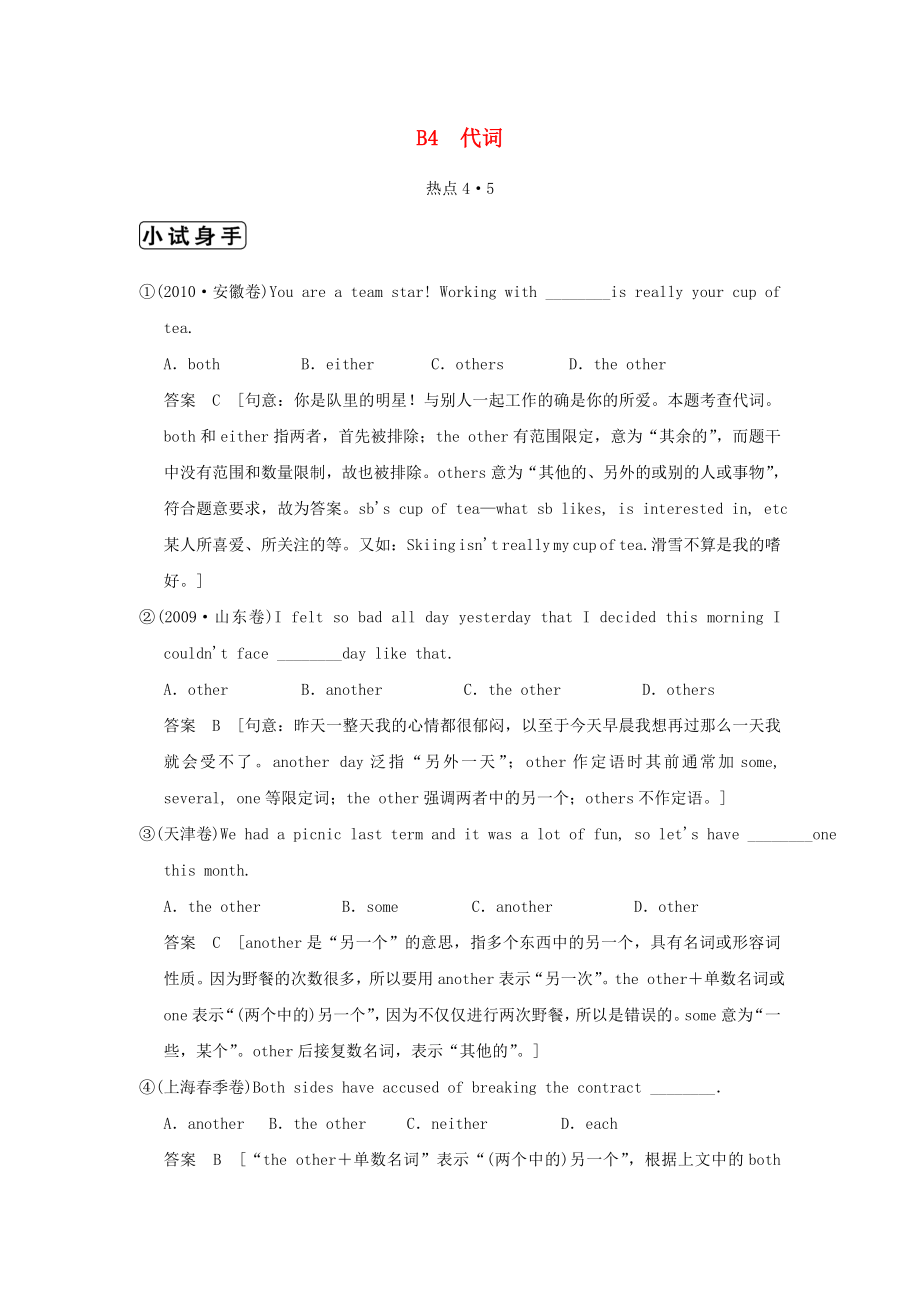《(江蘇專用)高三英語二輪復(fù)習(xí) 高頻考點(diǎn)(高頻 規(guī)律 技巧)小試身手 B4(4.5)代詞》由會(huì)員分享�����,可在線閱讀�,更多相關(guān)《(江蘇專用)高三英語二輪復(fù)習(xí) 高頻考點(diǎn)(高頻 規(guī)律 技巧)小試身手 B4(4.5)代詞(3頁珍藏版)》請(qǐng)?jiān)谘b配圖網(wǎng)上搜索。
1�、B4 代詞
熱點(diǎn)4·5
①(2010·安徽卷)You are a team star! Working with ________is really your cup of tea.
A.both B.either C.others D.the other
答案 C [句意:你是隊(duì)里的明星!與別人一起工作的確是你的所愛����。本題考查代詞。both和either指兩者��,首先被排除����;the other有范圍限定,意為“其余的”��,而題干中沒有范圍和數(shù)量限制,故也被排除���。others意為“其他的��、另外的或別的人或事物”���,符合題意要求,故為答案��。sb's cup of tea
2�����、—what sb likes, is interested in, etc某人所喜愛�����、所關(guān)注的等�����。又如:Skiing isn't really my cup of tea.滑雪不算是我的嗜好���。]
②(2009·山東卷)I felt so bad all day yesterday that I decided this morning I couldn't face ________day like that.
A.other B.a(chǎn)nother C.the other D.others
答案 B [句意:昨天一整天我的心情都很郁悶�,以至于今天早晨我想再過那么一天我就會(huì)
3、受不了��。another day泛指“另外一天”�;other作定語時(shí)其前通常加some, several, one等限定詞�����;the other強(qiáng)調(diào)兩者中的另一個(gè)�����;others不作定語���。]
③(天津卷)We had a picnic last term and it was a lot of fun, so let's have ________one this month.
A.the other B.some C.a(chǎn)nother D.other
答案 C [another是“另一個(gè)”的意思����,指多個(gè)東西中的另一個(gè)�����,具有名詞或形容詞性質(zhì)�����。因?yàn)橐安偷拇螖?shù)很多,所以要用anot
4���、her表示“另一次”���。the other+單數(shù)名詞或one表示“(兩個(gè)中的)另一個(gè)”,因?yàn)椴粌H僅進(jìn)行兩次野餐�����,所以是錯(cuò)誤的���。some意為“一些��,某個(gè)”�。other后接復(fù)數(shù)名詞��,表示“其他的”����。]
④(上海春季卷)Both sides have accused of breaking the contract ________.
A.a(chǎn)nother B.the other C.neither D.each
答案 B [“the other+單數(shù)名詞”表示“(兩個(gè)中的)另一個(gè)”,根據(jù)上文中的both sides可判斷出雙方相互指責(zé)對(duì)方違約��。another是“另一個(gè)”的意思,指多
5��、個(gè)東西中的另一個(gè)��,具有名詞或形容詞性質(zhì)���。neither(兩者)都不�;each每一個(gè)����,表示多于兩個(gè)�����。]
⑤(上海卷)I made so many changes in my composition that only I could read it. To ________else, it was hard to make out.
A.none B.everyone C.someone D.a(chǎn)nyone
答案 D [anyone用于肯定句中表示“任何人”��,anyone else意為“其他任何人”����,表示對(duì)其他任何人來說很難弄明白。none意為“沒誰�����,沒人,沒有任何事物�,沒有
6、任何一點(diǎn)”���,指代人�、事物或東西的一部分���,可以獨(dú)立使用�����,也可同of結(jié)合��,作主語時(shí)�����,動(dòng)詞使用單�、復(fù)數(shù)形式均可����。everyone意為“每個(gè)人”。someone意為“某人”���。]
⑥(上海卷)No progress was made in the trade talk as neither side would accept the conditions of ________.
A.others B.the other C.either D.a(chǎn)nother
答案 B [the other意為“另一方”���。因?yàn)檎勁惺莾煞?�,所以要用the other表示“另一方”�。others相當(dāng)于o
7����、ther+可數(shù)名詞復(fù)數(shù)形式,意思是“另外一些”���。either的意思是“(兩者中的)任何一個(gè)都”�。another是“另一個(gè)”的意思��,指多個(gè)東西中的另一個(gè)����,具有名詞和形容詞性質(zhì)���,在句中作主語���、賓語和定語等,可指人也可指物。]
⑦Some of the wheat is from Canada. What about ______����?
A.a(chǎn)nother B.the other C.others D.the rest
答案 D [代替不可數(shù)名詞,分兩部分����,故選D。]
⑧He will drop in on us ________day.
A.some others B.a(chǎn)n
8�����、other C.other D.the rest
答案 B [another是“另一個(gè)”的意思��。句意:他會(huì)另外安排一天拜訪我們�。]
⑨(北京春季卷)If this dictionary is not yours, ________can it be?
A.what else B.who else C.which else's D.who else's
答案 D [who else其他什么人。條件狀語從句中所說是誰的詞典�����,主句的主語要用所有格who else's��,表示其他什么人的���。]
⑩(全國卷)If you want to change for a double room, you'll have to pay ________15.
A.a(chǎn)nother B.other C.more D.each
答案 A [another在一般情況下后接單數(shù)名詞或者one����,表示“另外一個(gè)”。但如果復(fù)數(shù)名詞前有數(shù)詞時(shí)�����,可用another�����,表示“另外多少個(gè)”�����。],
 (江蘇專用)高三英語二輪復(fù)習(xí) 高頻考點(diǎn)(高頻 規(guī)律 技巧)小試身手 B4(4.5)代詞
(江蘇專用)高三英語二輪復(fù)習(xí) 高頻考點(diǎn)(高頻 規(guī)律 技巧)小試身手 B4(4.5)代詞

